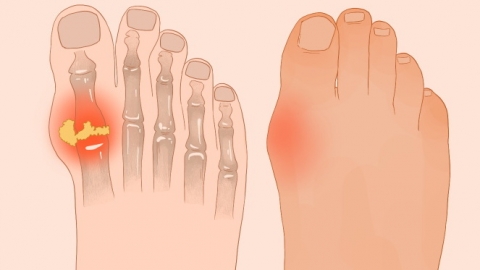What should not be eaten with high uric acid
Generally, individuals with high uric acid levels should avoid consuming animal offal, certain seafood, concentrated meat broth, beer, high-fructose beverages, and medications such as aspirin enteric-coated tablets, hydrochlorothiazide tablets, furosemide tablets, pyrazinamide tablets, and niacin tablets. These foods and medications may cause uric acid levels to rise or affect uric acid excretion, with varying effects among individuals. Detailed analysis is as follows:
1. Food
1. Animal Offal: Such as pork liver, chicken kidney, and pig brain, which contain extremely high levels of purines. Consumption leads to a sharp increase in uric acid within the body, exceeding the excretion capacity of the kidneys, easily causing elevated uric acid levels and triggering gout.
2. Certain Seafood: Including sardines, anchovies, and clams, which are high-purine foods. Ingestion increases uric acid production,加重s metabolic burden, and may easily cause joint discomfort when uric acid control is unstable.
3. Concentrated Meat Broth: Such as beef soup and mutton soup. The purines in meat dissolve in water, and after prolonged cooking, large amounts of purines enter the broth. Consuming the broth results in higher purine intake than eating the meat itself, leading to elevated uric acid levels.
4. Beer: The fermentation process produces large amounts of purines, and alcohol inhibits uric acid excretion. These dual effects rapidly increase uric acid concentration, making it a common trigger for gout, which must be strictly avoided.
5. High-Fructose Beverages: Such as cola and non-pure fruit juice drinks. The high-fructose corn syrup contained promotes purine synthesis and reduces uric acid excretion. Long-term consumption easily leads to sustained elevation of uric acid levels.

II. Medications
1. Aspirin Enteric-Coated Tablets: Inhibit the excretion of uric acid by renal tubules, leading to uric acid accumulation. Individuals with high uric acid levels should avoid long-term use of high-dose aspirin.
2. Hydrochlorothiazide Tablets: A thiazide diuretic commonly used for blood pressure reduction and diuresis. It reduces uric acid excretion, and long-term use may elevate uric acid levels and induce gout. Risk assessment is needed before use.
3. Furosemide Tablets: A potent diuretic used to treat edema. It affects uric acid excretion, causing uric acid retention and elevated uric acid levels. Individuals with high uric acid should use it cautiously.
4. Pyrazinamide Tablets: An anti-tuberculosis medication that inhibits uric acid excretion and promotes purine breakdown, increasing uric acid production. Uric acid levels should be monitored regularly during use.
5. Niacin Tablets: A member of the B-complex vitamins. High doses reduce uric acid excretion, leading to elevated uric acid levels and inducing gout. Dosage must be strictly controlled during use.
Individuals with high uric acid levels should maintain a low-purine diet, eat more fresh fruits and vegetables, drink plenty of water to promote uric acid excretion, and develop regular作息 habits, avoiding staying up late or overexertion. Medications should be strictly taken as directed by a physician, and the physician should be informed of one's uric acid status. Self-medication or dose adjustments should be avoided to prevent interference with uric acid control.






